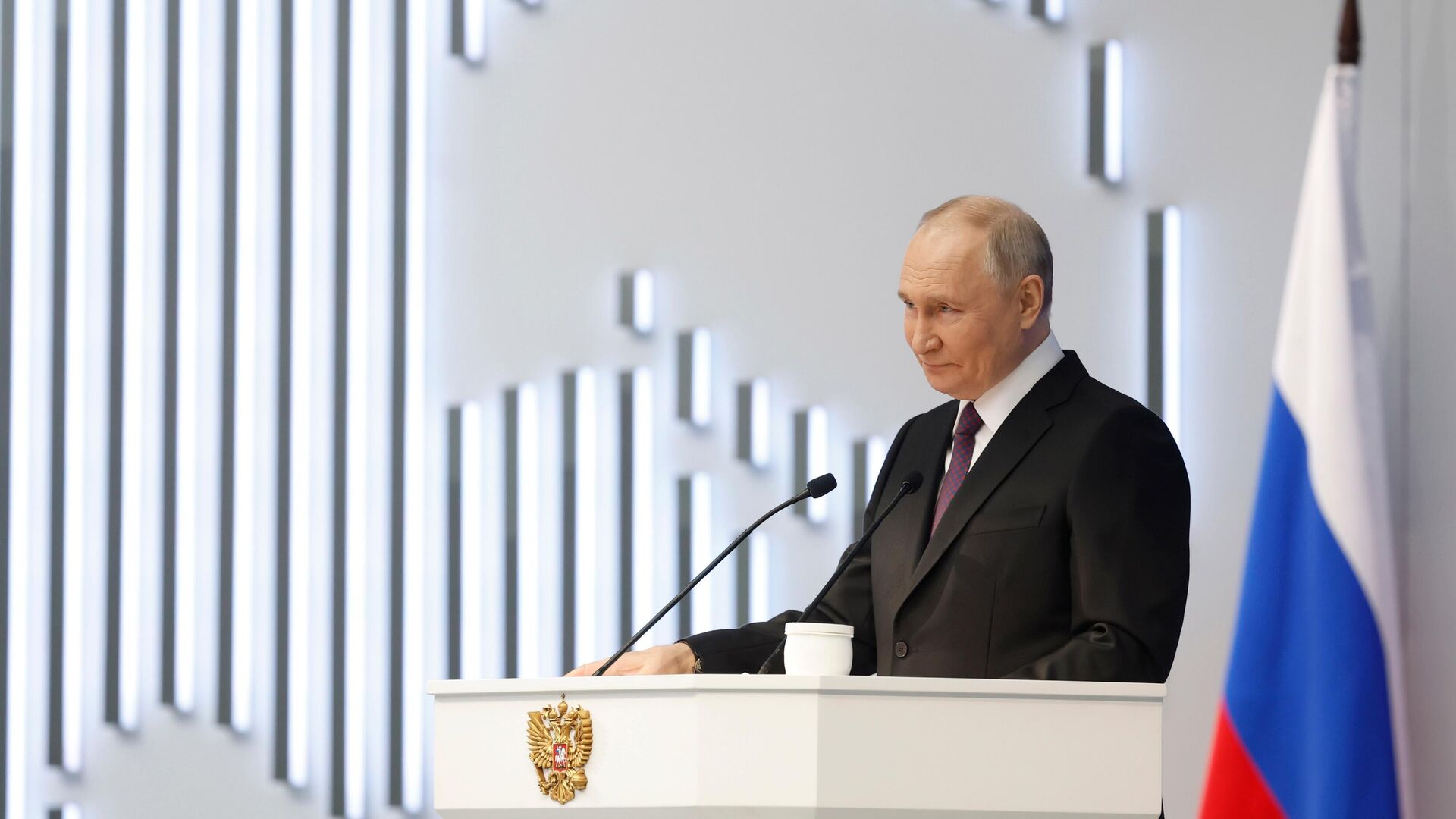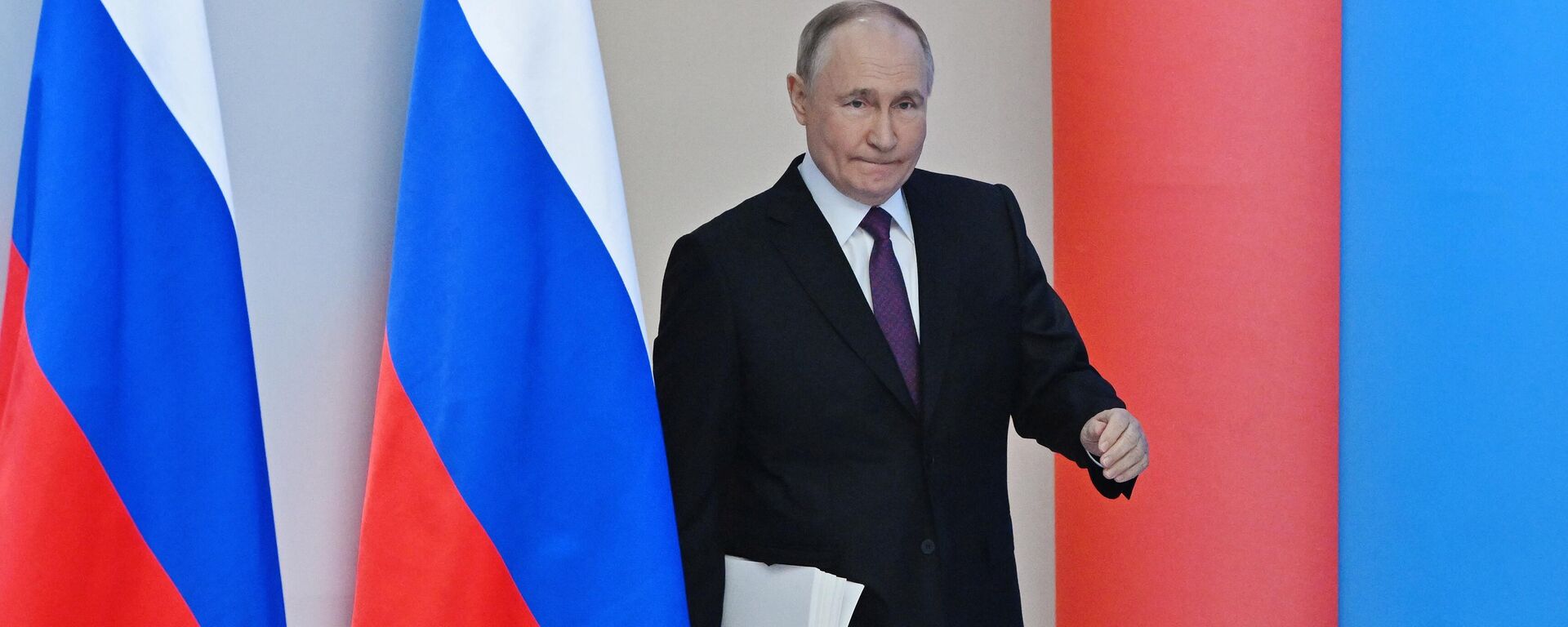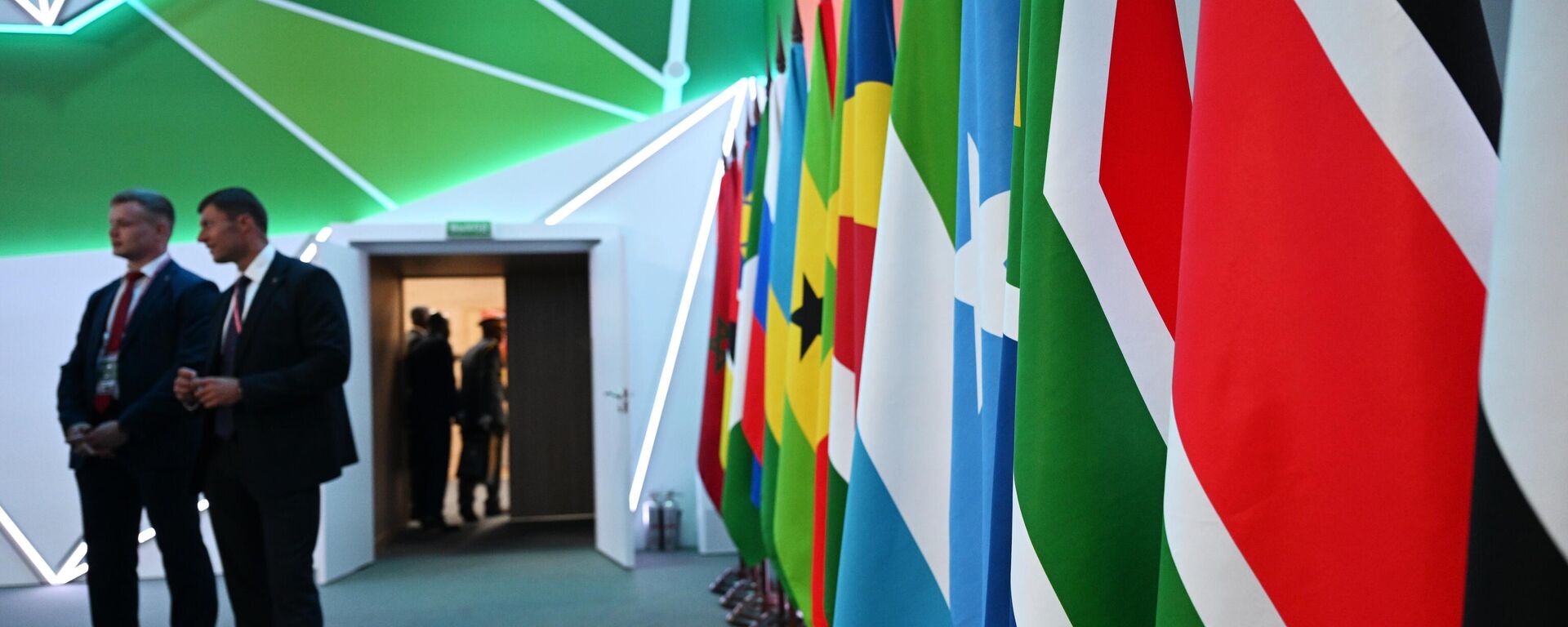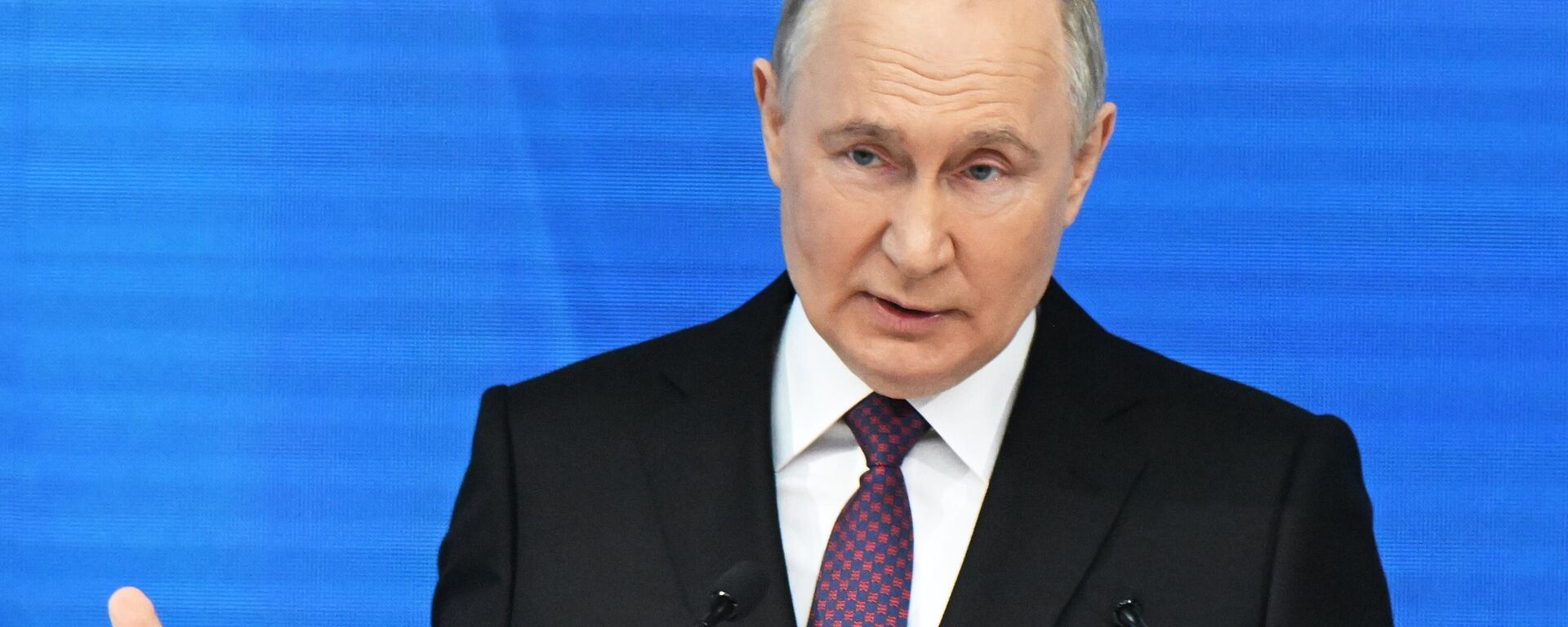https://en.sputniknews.africa/20240301/unpacking-putins-address-to-russian-federal-assembly-african-experts-share-insights-1065339837.html
Unpacking Putin's Address to Russian Federal Assembly: African Experts Share Insights
Unpacking Putin's Address to Russian Federal Assembly: African Experts Share Insights
Sputnik Africa
Russian President Vladimir Putin's recent lengthy address to the Federal Assembly has sparked significant discussions globally, particularly regarding the... 01.03.2024, Sputnik Africa
2024-03-01T18:01+0100
2024-03-01T18:01+0100
2024-03-01T18:01+0100
opinion
russia-africa cooperation
vladimir putin
russia's state duma
parliament
brics
brics expansion
us dollar
ditching dollar
de-dollarization
https://cdn1.img.sputniknews.africa/img/07e8/03/01/1065346097_0:204:3278:2048_1920x0_80_0_0_c0e0c05249add232c60c7611e8df134a.jpg
Vladimir Putin's annual address to the Russian Federal Assembly on Thursday covered a wide range of issues, touching both domestic and international affairs, and was quite detailed in its approach, Dr. Nicodemus Minde, a researcher at the Institute for Security Studies in Nairobi, Kenya, told Sputnik Africa.On the domestic front, Putin emphasized fundamental values such as the role of youth and the importance of the family in shaping Russia's future. Meanwhile, on the global front, he touched on issues such as the conflict in Ukraine, neo-colonialism and de-dollarization, as well as multipolarity.Ukraine ConflictIn his Thursday speech, the Russian president asserted his determination to achieve all the objectives of the Russian special military operation in Ukraine. Commenting on Putin's determination to achieve the objectives of the operation in Ukraine, Mikatekiso Kubayi, a researcher at the Institute for Global Dialogue and the Institute for Pan African Thought and Conversation in South Africa, expressed deep concern regarding the potential for a catastrophic global conflict with the involvement of NATO states in the Russia-Ukraine conflict.Putin's condemnation of Western involvement in the Ukrainian conflict resonated with Kubayi, who criticized the preference for military solutions over diplomatic negotiations.For his part, Dr. Nicodemus Minde commented on French President Emmanuel Macron's recent remarks about the possibility of sending Western forces to the conflict zone in Ukraine – a move that was strongly condemned by Putin on Thursday.Dr. Minde delved into the misinterpretations of Russia's intentions by the West, attributing them to a lack of historical understanding. He referenced Putin's recent interview with Tucker Carlson, where historical myths were debunked, shedding light on Russia's perspective on various international matters, including its involvement in Ukraine.Western Neo-ColonialismPutin's criticism of Western neo-colonial practices struck a chord with Kubayi, reflecting a broader sentiment in Africa and the global South against remnants of colonialism. According to the Russian president, the West seeks to restrict the development of other nations and maintain their dependent status.By emphasizing the importance of sovereignty and independence in decision-making, Kubayi highlighted an example of the struggle of African Sahel countries to free themselves from external influences and assert their autonomy.Commenting on the same point, Dr. Minde highlighted how countries in the Sahel region, formerly under colonial rule, are reevaluating their relationships with former colonial powers like France.De-dollarization & MultipolarityIn his address to the Russian Parliament, President Putin called for de-dollarization and the use of national currencies, which has been actively promoted by the BRICS countries in recent years. Putin criticized the West's reliance on the dollar-centric financial system and its use to pressure other countries.Putin's call resonated with Kubayi, who viewed this shift as a means to promote financial autonomy and facilitate trade without intermediaries.The discourse on de-dollarization, as advocated by Russian President Vladimir Putin, was also elucidated by Dr. Minde. He underscored the advantages of transitioning away from the dominance of the dollar in global transactions.De-dollarization offers countries greater autonomy over their monetary policies, reducing their dependence on institutions like the World Bank and the International Monetary Fund (IMF). Dr. Minde provided examples from the East African region, illustrating how shifting away from the dollar could facilitate more seamless cross-border trade.In the context of Africa's quest for increased sovereignty, Dr. Minde highlighted Russia's support for the continent's aspirations. Putin's acknowledgment of Africa's growing voice, particularly through platforms like the Russia-Africa summit and the Forum on China-Africa Cooperation (FOCAC), reflects a global shift towards recognizing Africa's influence and agency in shaping international affairs.In the same vein, Putin's endorsement of Africa's sovereignty aligns with Kubayi's perspective on the evolving global order. Kubayi emphasized that the call for a multipolar world is not exclusive to Russia but resonates widely across the Global South, including within the BRICS bloc and among some Western scholars advocating for systemic reforms.Dr. Minde highlighted the significance of BRICS' expansion to include new member countries such as Egypt and Ethiopia. He emphasized that this enlargement aligns with BRICS' original vision of fostering a multipolar world and decentralizing monetary policies to counter Western geopolitical influence.With the addition of African nations such as Egypt and Ethiopia, alongside Saudi Arabia, Iran, and the UAE, the BRICS bloc contributes to the establishment of a multipolar global order, Dr. Minde concluded.
https://en.sputniknews.africa/20240229/highlights-from-russian-president-putins-address-to-parliament-1065320569.html
https://en.sputniknews.africa/20240301/africa-becomes-one-of-priorities-in-russias-foreign-policy-says-ministry-1065333274.html
https://en.sputniknews.africa/20240229/putin-praises-russias-dialogue-with-asean-africa-arab-countries-1065317181.html
west
ukraine
russia
Sputnik Africa
feedback@sputniknews.com
+74956456601
MIA „Rossiya Segodnya“
2024
Muhammad Nooh Osman
https://cdn1.img.sputniknews.africa/img/07e7/04/0a/1058467512_0:0:1280:1280_100x100_80_0_0_ec723833bcbfcaed2e21952965ad99e4.jpg
Muhammad Nooh Osman
https://cdn1.img.sputniknews.africa/img/07e7/04/0a/1058467512_0:0:1280:1280_100x100_80_0_0_ec723833bcbfcaed2e21952965ad99e4.jpg
News
en_EN
Sputnik Africa
feedback@sputniknews.com
+74956456601
MIA „Rossiya Segodnya“
Sputnik Africa
feedback@sputniknews.com
+74956456601
MIA „Rossiya Segodnya“
Muhammad Nooh Osman
https://cdn1.img.sputniknews.africa/img/07e7/04/0a/1058467512_0:0:1280:1280_100x100_80_0_0_ec723833bcbfcaed2e21952965ad99e4.jpg
russia-africa cooperation, vladimir putin, russia's state duma, parliament, brics, brics expansion, us dollar, ditching dollar, de-dollarization, multipolarity, international, west, north atlantic treaty organization (nato), ukraine, ukraine crisis, emmanuel macron, tucker carlson, russia
russia-africa cooperation, vladimir putin, russia's state duma, parliament, brics, brics expansion, us dollar, ditching dollar, de-dollarization, multipolarity, international, west, north atlantic treaty organization (nato), ukraine, ukraine crisis, emmanuel macron, tucker carlson, russia
Unpacking Putin's Address to Russian Federal Assembly: African Experts Share Insights
Muhammad Nooh Osman
Writer/Editor
Russian President Vladimir Putin's recent lengthy address to the Federal Assembly has sparked significant discussions globally, particularly regarding the ongoing conflict in Ukraine and broader geopolitical issues.
Vladimir Putin's annual
address to the Russian Federal Assembly on Thursday covered a wide range of issues, touching both domestic and international affairs, and was quite detailed in its approach,
Dr. Nicodemus Minde, a researcher at the Institute for Security Studies in Nairobi, Kenya, told
Sputnik Africa.
On the domestic front, Putin emphasized fundamental values such as the role of youth and the importance of the family in shaping Russia's future. Meanwhile, on the global front, he touched on issues such as the conflict in Ukraine, neo-colonialism and de-dollarization, as well as multipolarity.
In his Thursday speech, the Russian president asserted his determination to achieve all the objectives of the Russian special military operation in Ukraine.
Commenting on Putin's determination to achieve the objectives of the operation in Ukraine, Mikatekiso Kubayi, a researcher at the Institute for Global Dialogue and the Institute for Pan African Thought and Conversation in South Africa, expressed deep concern regarding the potential for a catastrophic global conflict with the involvement of NATO states in the Russia-Ukraine conflict.
"You have a NATO that is busy very actively pursuing expansion. It's not hiding that," Kubayi told Sputnik Africa. "It does this at the exclusion or the neglect of other voices that have been sharing their concerns about these developments. And that's a very dangerous thing to have. The last thing you want to have in the world is an extended conflict where the world is supposed to be focusing on achieving development and not conflict."
Putin's condemnation of Western involvement in the Ukrainian conflict resonated with Kubayi, who criticized the preference for military solutions over diplomatic negotiations.
"Why is it that instead of looking at engaging and deliberating over peace, you want to send bombs instead? It doesn't make any sense," Kubayi said.
For his part, Dr. Nicodemus Minde commented on French President Emmanuel
Macron's recent remarks about the possibility of sending Western forces to the conflict zone in Ukraine – a move that was strongly condemned by Putin on Thursday.
"I think Putin could be right in terms of how he assesses this possibility and proposition that was made by France, it will just go ahead and escalate tensions. And of course exacerbate an already very fragile situation as it were. So, I think Putin's assessment was right," Dr. Minde said.
Dr. Minde delved into the misinterpretations of Russia's intentions by the West, attributing them to a lack of historical understanding. He referenced Putin's recent
interview with Tucker Carlson, where historical myths were debunked, shedding light on Russia's perspective on various international matters, including its involvement in Ukraine.
"The reading of the history of Russia by the West is quite problematic," Dr. Minde said. "What the European media, Western media often miss is that it needs to be really explained [the situation] to be rooted in the whole Russia's history so that they can be able to really understand their intentions and positions with regard to certain issues, for instance, its involvement in Ukraine and other areas of Russia's foreign policy."
Putin's criticism of Western
neo-colonial practices struck a chord with Kubayi, reflecting a broader sentiment in Africa and the global South against remnants of colonialism. According to the Russian president, the West seeks to restrict the development of other nations and maintain their dependent status.
By emphasizing the importance of sovereignty and independence in decision-making, Kubayi highlighted an example of the struggle of African Sahel countries to free themselves from external influences and assert their autonomy.
"This is just one example of such, but the move, the sentiment is generally definitely against the continued exploitation of people. Countries, people, states, want complete sovereignty and complete independence of decision-making choices and so on. And sovereignty in its purest form, and complete sovereignty, and that's what they want," the South African expert said.
Commenting on the same point, Dr. Minde highlighted how countries in the Sahel region, formerly under colonial rule, are reevaluating their relationships with former colonial powers like France.
"There's some sort of renegotiation in the concept of sovereignty and wanting more and more increased autonomy for their countries," the Kenyan academician analyzed.
De-dollarization & Multipolarity
In his address to the Russian Parliament, President Putin called for de-dollarization and the use of national currencies, which has been actively promoted by the
BRICS countries in recent years. Putin criticized the West's reliance on the dollar-centric financial system and its use to pressure other countries.
Putin's call resonated with Kubayi, who viewed this shift as a means to promote financial autonomy and facilitate trade without intermediaries.
"The issue of de-dollarization, first and foremost, is not an issue against the United States or even against the dollar. It's about promoting local currencies," Kubayi argued. "Sometimes, doing trade in local currencies could be cheaper, could be easier to administer. It could be quicker, smoother, and so on. And it could yield real benefits for the trading partners."
The discourse on de-dollarization, as advocated by Russian President Vladimir Putin, was also elucidated by Dr. Minde. He underscored the advantages of transitioning away from the dominance of the dollar in global transactions.
De-dollarization offers countries greater autonomy over their monetary policies, reducing their dependence on
institutions like the World Bank and the International Monetary Fund (IMF). Dr. Minde provided examples from the East African region, illustrating how shifting away from the dollar could facilitate more seamless cross-border trade.
"For instance, here in East Africa, we have the East African Community. If we are able to really move away from that dominance of the dollar, countries such as Tanzania and Kenya could actually trade using their shilling, which could also really be beneficial for both countries, as opposed to, first of all, changing their currencies to the dollar so that they can be able to really trade. So it will actually really increase trade across borders," he explained.
In the context of Africa's quest for increased sovereignty, Dr. Minde highlighted Russia's support for the continent's aspirations. Putin's acknowledgment of Africa's growing voice, particularly through platforms like the Russia-Africa summit and the Forum on China-Africa Cooperation (FOCAC), reflects a global shift towards recognizing Africa's influence and agency in shaping international affairs.
In the same vein, Putin's endorsement of Africa's sovereignty aligns with Kubayi's perspective on the evolving global order. Kubayi emphasized that the call for a
multipolar world is not exclusive to Russia but resonates widely across the Global South, including within the BRICS bloc and among some Western scholars advocating for systemic reforms.
"The Global South has been looking forward to such a system," Kubayi stated. "In fact, some of us have even argued that it has already started to take shape. And it's not something that is being thumb-sucked, once again, it's not something that is being imagined. That's something that's already happening."
Dr. Minde highlighted the significance of BRICS' expansion to include new member countries such as Egypt and Ethiopia. He emphasized that this enlargement aligns with BRICS' original vision of fostering a multipolar world and decentralizing monetary policies to counter Western geopolitical influence.
With the addition of African nations such as Egypt and Ethiopia, alongside Saudi Arabia, Iran, and the UAE, the BRICS bloc contributes to the establishment of a multipolar global order, Dr. Minde concluded.





